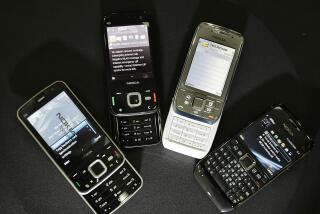‘Computerphobes’ Assign a Low Priority to High Technology : Psychology: Experts say it’s not stupidity, but as science marches on, some people are left to flounder in techno-angst.
- Share via
Something is wrong--drastically wrong--in Frances Hofmann’s cozy Colonial-style home. The digital clocks tell the tale: It’s high noon in the bedroom, minutes shy of 11 in the kitchen and exactly 10:15 in the den.
Does anybody really know what time it is?
Hofmann does. She swears she does. She just can’t figure out how to set her clocks.
Or program her VCR. Or defrost in her microwave. Or call long-distance from her car phone.
In this user-friendly universe, where Americans fax, zap and Fedex more regularly than they brush and floss, Hofmann marches to the beat of a different drum. One that isn’t plugged in. Technology may take society to future shocklike heights, but she is, quite simply and quite proudly, a “low techie.”
And she isn’t alone, says Larry Rosen, professor of psychology at Cal State Dominguez Hills, who has studied computer phobia for eight years. In a survey released last year, he found that a quarter to half of the population suffers from some form of techno-angst.
Palms sweat when placed near automated teller machines. Inner voices repeat, “You’re going to break it, you’re going to break it,” when approaching a VCR. Instruction manuals induce migraines.
What’s to blame? A frustrating first experience led by an ill-at-ease instructor, says the study, which was co-written by clinical psychologist Michelle Weil.
“Contrary to popular opinion, (computerphobes) are not more likely to be women; they are not more likely to be older and they are not more likely to be less intelligent,” says Rosen, whose survey subjects included college professors, computer scientists and students. “These people are not stupid. They are just as bright as people who do use computers. They’re just uncomfortable with the technology itself.”
The reasons people give for their aversions are as varied as the software on the market today. Many cite fear, laziness and ambivalence. Others worry that these advances will complicate already hectic lives. And a small group claims it is willfully ignorant, a symbolic gesture done to quietly protest the increasingly impersonal nature of today’s technology.
Hofmann, 43, of Perry Hall, Md., puts it more simply: “My mind doesn’t work that way and I don’t want my mind to work that way.”
For David Hoard, 30, associate director of alumni services at Towson State University in Baltimore, life sometimes seems like a mine field of computer glitches.
Two months ago, he and his bank machine called it quits. After six attempts to withdraw cash, the ATM canceled his transaction and kept his card. “I was there for a half-hour,” he recalls. “There were about eight people behind me. You could hear the mumbles and grumbles.”
And how did Hoard--a graduate of Oberlin College and a master’s candidate at the University of Maryland--feel?
“Dumb. Real dumb,” he says.
Then there’s his microwave misadventure. He tried to defrost frozen ground turkey recently. Pressing the “express defrost” button didn’t work, reading the instruction booklet didn’t help, so he and his wife tried the old-fashioned method: They let the turkey thaw on the counter for two hours.
“Having the microwave didn’t save me one minute,” he says glumly. “Sometimes I start asking myself, ‘Why did I buy this machine? Why can’t I understand how to use it? And why am I letting it take up too much room in my kitchen?’ ”
When he honestly answers those questions, he admits that “peer pressure” caused him to shell out hundreds of dollars for gadgets he can’t always operate. “I guess it’s part of keeping up with the Joneses. Everyone has them, so why shouldn’t we?”
According to a recent study conducted by LINK Resources Corp., a Manhattan-based research and consulting firm, more than 70% of American homes now have VCRs, 31% have answering machines and 22% have personal computers.
But purchasing this equipment doesn’t guarantee it will be used, the study found. Thirty percent of all VCR owners never record while away from home and 25% of all personal computer owners use their machines twice a month or less.
Tim Willard, communications director for the World Future Society, a nonprofit think tank in Bethesda, Md., says the confusion is not always the user’s fault. “Poor design can be blamed for a lot of technological discomfort,” he says. “A digital watch where you stick a pin through a small hole is just a crummy design.”
He adds that sometimes more pressing concerns cause people to avoid machines. “Some people have actual fears they will electrocute themselves or receive radiation from video display terminals,” he says.
Although Rosen’s study found no proof that age plays a factor in mastering consumer electronics, one 41-year-old technophobe believes that having a Nintendo-less childhood has made life more difficult.
“When we were growing up, computers were the size of rooms and only NASA had them,” says the Maryland artist who asked that her real name not be used. “I still think computers work by magic. There’s a little man inside. It took me years before I realized how the toaster knew the toast was brown.”
Yet, she wouldn’t trade her low-tech life style for all the compact-disc players in the world. “I’d rather be reading trashy novels or fine literature than instruction manuals,” she says proudly.
For some, snobbishness is at work. Consumer electronics technician Henry Anderson occasionally sees it in his customers. “Sometimes, it’s a question of arrogance,” he says. “Some people are so busy being cerebral and intellectual they don’t have the time to learn where the controls are. It’s like, ‘I’ll leave that to lesser beings.’ ”
Lizbeth Binks, a psychologist in Sykesville, Md., sums up her attitude toward high technology: “I embrace it, reject it and fear it all at the same time.”






